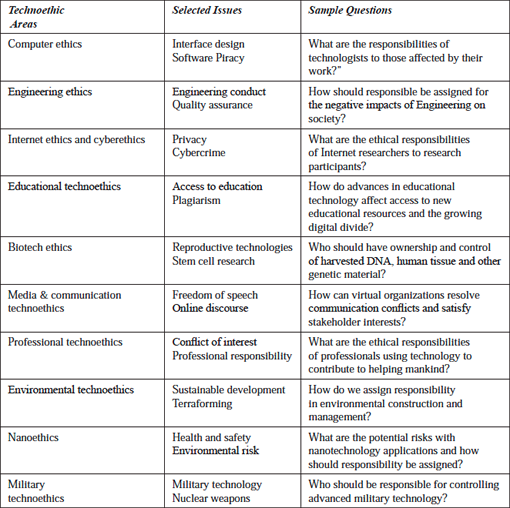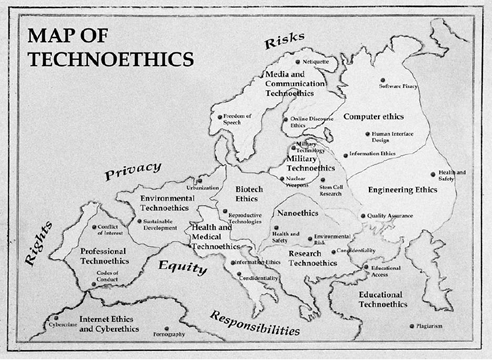Archive for October 30th, 2012
Introductions: Technoethics no comments
Moor on Ethics & Technology
Moor (2005) believed that with an increase in the social impact of technological advances, the number of ethical challenges also increase. He suggested that this is a result of the ever-increasing novel uses of technological advances and a lack of ethical inquiry into these activities. For example, the Web has fundamentally altered the social contexts within which we live, work and play. It has raised several questions including some about the legitimacy of human relationships maintained using its platform, its facilitation of illegal activity on a large scale and the privacy of its users.
However, though these are very present and pressing societal issues, they are also vast areas for investigation, and there is relatively sparse research coverage. Also, an added dimension to this challenge is that technological advances seem to continuously change the standard ethical questions. Thereby researchers are forced to simultaneously attempt to explore the ethical implications of these technologies as they were, are now and could be in the future.
Technoethics: Tackling New Types of Ethical Questions
Unsurprisingly, many of the current debates surrounding technological advancement are addressed by technoethics (TE). They are some of the most challenging issues that scientists, innovators and technologists will face. These challenges usually characterise the roles these individuals play when plotting an ambitious route for the future. They inadvertently raise important questions about rights, privacy, responsibility and risk that must be adequately answered.

However, due to the variety of questions resulting in as much ethical inquiries that are based in different fields, there is a tendency for this knowledge to be somewhat disconnected. TE pulls this knowledge together around the central idea of technology. Moreover, unlike traditional applied ethics where focus is placed on an ethical concern for living things, TE is ‘biotechno-centric’. As the Web is to Web science, technology, as well as living things, are central in TE.
The Technoethics Way
Tracing its origins back to the late 1970s, TE emerged as an interdisciplinary field tasked with the job of answering the difficult questions posed earlier. Coined by Mario Bunge (1977), TE does not only assign technical responsibility to technologists but also gives them social and moral responsibility for their technological innovations and applications. It is believed that technologists are responsible for ensuring that their technologies are optimally efficient, not harmful and that its benefits are lasting.
This field distinguishes itself from other branches of applied ethics by elevating technology to the level of living things. However, it also builds on knowledge from wider ethical inquiry as well. TE has many sub-areas, for example, Internet, computer, biotech, cyber and nano ethics.

Calling All Web Scientists
Since the Web’s creation years ago, an understanding of this ever-changing phenomenon and its impact has been developing at a rapid pace in many disciplines. Yet there is a great deal more to learn, especially when the Web is positioned as the subject of focus. Considering Bunge’s views on technoethics, I believe that this obligation rests with Web scientists who are technically, morally and socially responsible for Web innovations and applications.

As a budding Web scientist, thinking about how technoethics applies to Web science, I am absolutely fascinated by all the very interesting questions that could be asked and that I could work towards answering. Ultimately, for us Web scientists, the aims of technoethics could be achieved by gaining insight into the relationship between people, the society and the Web, and how these entities impact each other.
Notes
This & Last Week’s Plan
Identifying the simplest books to read that will give an easy to understand introduction to the disciplines I picked.Making notes on books read.Prepare a blog post that gives an overview of what I want to work on.Publish a blog post that introduces technoethics.- Publish a blog post that introduces risk management.
Outline a reading plan for moving forward.
Introductory Readings
Ethics: A Very Short Introduction– Simon BlackburnHandbook fo Research on Technoethics– Rocci Luppicini & Rebecca AdellRisk: A Very Short Introduction– Baruch FischhoffFundamentals of Risk Management Understanding, Evaluating and Implementing Effective Risk Management– Paul Hopkin
EWIII: Philosophy and Law no comments
This week, I did some general reading across 3 books, though I only read one of them completely. The book I read completely was Gillies and Cailliau, How the Web was Born. This is a really good general history book of the web and just computers generally. For a non-technical and very interesting overview of where the web comes from I recommend it. They talk about TimBL’s adventures, Apple, Microsoft, Mozilla, Marc Andreeson and so on. This is a great book for someone who knows absolutely nothing about computers.
The 2 other books that I had a general look through as background reading were Boyd & Richerson, Culture and the Evolutionary Process, and David Bainbridge, Introduction to Computer Law. Boyd and Richerson are sociologists – sort of. Most sociologists hate them – and most psychologists as well, I should point out. However I think they’re great. Just because they’re unpopular doesn’t mean they’re crazy. B&R were trained as ecologists but they practically created a new ‘scientific sociology’ area all by themselves. Basically, they thought that most sociology was philosophical hogwash, and so they wanted to create something more scientific. They tried to create a theory of culture and society that was heavily informed by relevant sciences, in their case especially by the biological evolutionary sciences, particularly population genetics. They describe a theory of how information of different kinds may move through a population of people, and then they propose some equations that may be able to describe how this happens. These equations are heavily inspired by similar recursion equations proposed in population genetics, which describe how certain kinds of genetic information move through certain kinds of populations under certain conditions over periods of time. I think this is really interesting stuff. Sociologists hate B&R because they’re, well, because they’re doing something that’s hard to understand and it looks scientific. Psychologists do not like B&R very much either because it looks as if they’re trying to explain human behaviour without even bothering to refer to human psychology and cognitive processes. Personally I agree with the this 2nd criticism, but I am willing to forgive B&R for it. They weren’t trained as psychologists, and we can’t expect them to be experts on everything. Overall, I recommend B&R though they are very difficult if you are not familiar with biological evolutionary theory. I read this stuff because I am thinking of a question at the moment: to what extent should we consider the internet to be a psychological human thing? To what extent is the internet cognitive stuff? This is the sort of thing that I proposed in my application for the course.
The final book I had a look at was Bainbridge, Introduction to Internet Law. I only managed a skim through, I’m afraid, as this is a monster of a book at 500+ pages. It’s more like a textbook than anything I suppose. It looks reasonably good and not too technical, though there is a disappointing lack of pictures. This will be my main reading for next week.